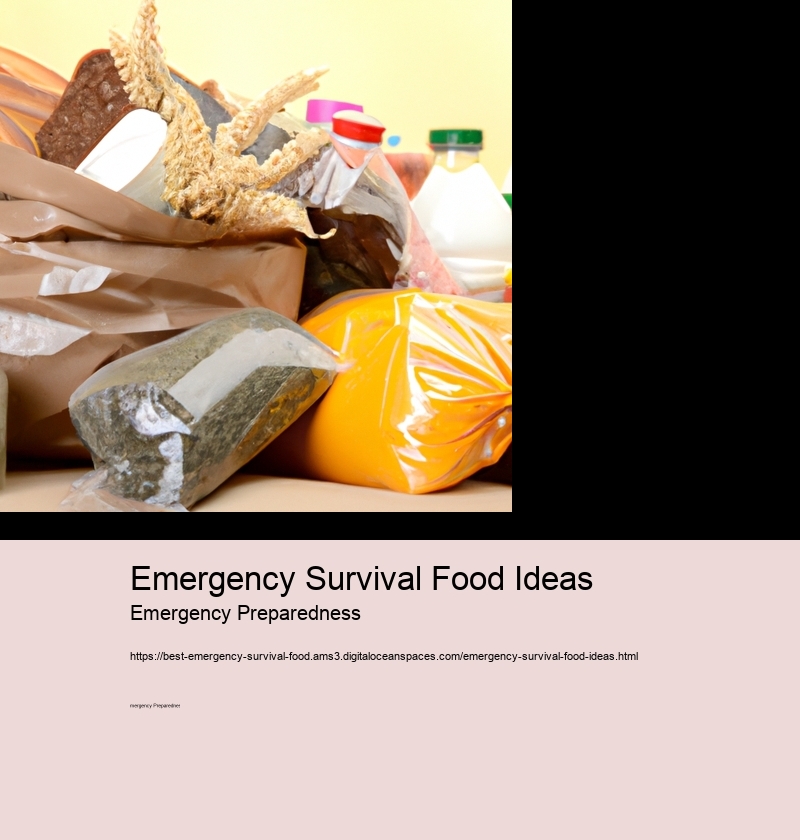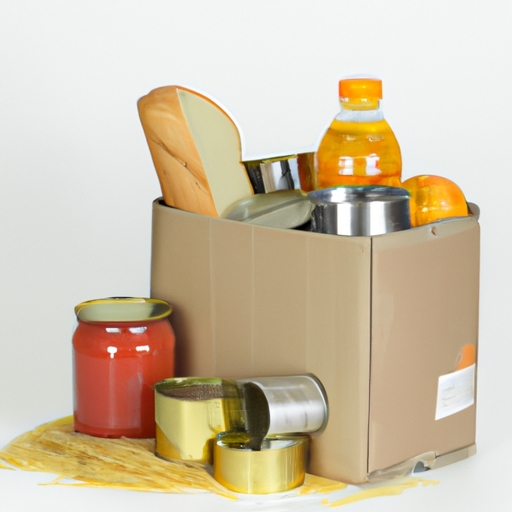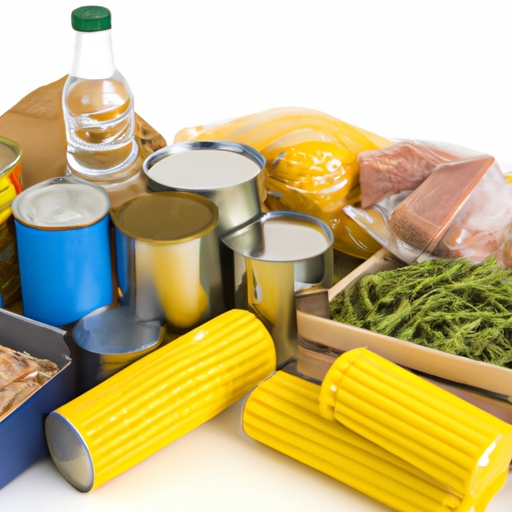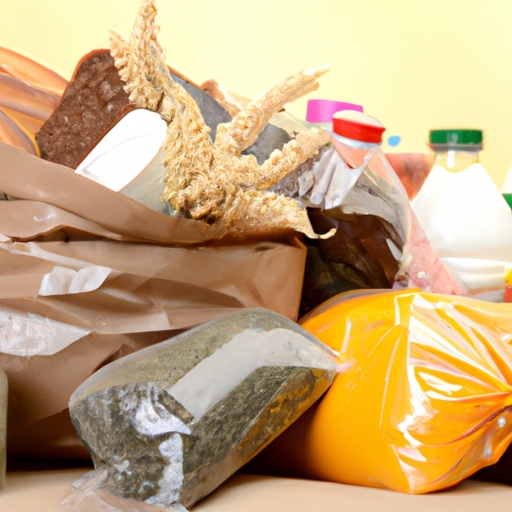Emergency Survival Food Ideas
Introduction

Introduction
Intruduction:
Survival during an emergency is largely dependent on having enough food. (But,) it's important to have the right kind of food. Not just any food will do! Food needs to be nutritious, non-perishable and easy to prepare. With that in mind, here are some ideas for emergency survival food stuffs:
First off, dried fruits and nuts make a great snack. They're packed with nutrition yet lightweight and can easily be stored away. Another idea is instant soups or pastas, as these require minimal amount of cooking and can be prepared quickly! Canned meats like tuna or salmon are also good options, as they contain protein but don't necessitate refrigeration. Furthermore, crackers and cereals are another convenient source of sustenance during an emergency situation.
Additionally, consider keeping a supply of energy bars handy too - they provide a concentrated burst of energy when you need it most! Finally, freeze-dried foods such as vegetables are a useful choice too; they won't spoil even after years if kept dry and cool.
All together now - these items should provide enough sustenance to keep you going in case of an emergency!
Types of emergency survival food
Emergency survival food is an important part of any survival plan. It's essential to have a supply of non-perishable food items that can provide nutrition and sustenance in the event of an emergency. There are many types of emergency survival food available, ranging from freeze dried meals to canned goods to energy bars.
Freeze dried meals come pre-packaged with all the ingredients necessary for a complete meal. They are lightweight, easy to store, and require no water or cooking for consumption. Canned goods such as beans, tuna, vegetables and fruits offer quick access to protein and nutrients. Energy bars provide a nutritious snack on the go; they contain carbohydrates and fats which can help sustain energy levels during stressful times.
Another option for emergency food is dehydrated foods like jerky, soup mixes and granola bars. These products do not require refrigeration or cooking, making them ideal for long-term storage purposes (such as in homes without power). Plus, they are often packed with vitamins and minerals which help keep you healthy during crisis situations!
Finally, there are nutrient supplements such as whey powder or multi-vitamins that can be added to other foods in order to boost their nutritional value. For example, adding whey powder to a smoothie adds protein while multi-vitamins provide extra minerals and vitamins needed for overall health maintenance.
In conclusion, there are many types of emergency survival food available that can help you survive an unexpected crisis situation! From freeze dried meals to canned goods to energy bars and even dehydrated foods - you have plenty of options when it comes to stocking up on sustenance in case of an emergency! Don't forget about nutrient supplements either; these can be great additions too! So make sure you're prepared by having some type(s) of emergency survival food stored away just in case!
Food storage tips
Food storage is an important part of emergency survival. (It) can help you and your family have enough to eat when times are tough. There are a few tips to remember when storing food for emergencies. Firstly, avoid buying canned goods which are already pre-packaged as they tend to contain preservatives and other unhealthy ingredients. Instead, opt for fresh or frozen foods that can be stored safely in the freezer. Secondly, make sure you rotate your food supply regularly so that it doesn't go bad (or) become stale over time. Additionally, keep items like rice and flour in airtight containers in dry places like cupboards or pantries to prevent them from going rancid. Lastly, don't forget about dried fruits and nuts which can provide essential nutrition during an emergency situation!
Furthermore, it's important to remember that emergency food should always be stored away from direct sunlight as it will cause spoilage faster than usual. Also, use smaller containers rather than large ones as this will help preserve the freshness of the food for longer periods of time. Moreover, label all items clearly with expiration dates so you know exactly how long they'll last before needing replacing!
In conclusion, following these simple food storage tips will ensure that you and your family have access to healthy meals during an emergency situation! Utilizing proper techniques for storing food items not only increases their shelf life but also helps conserve valuable resources in case of a disaster. Therefore, take care when preparing and stocking up on supplies for any potential crisis - it could end up being a lifesaver!
What to consider when stockpiling food for emergencies
Stockpiling food for emergencies is an important part of emergency preparedness. Taking the time to plan and consider what items you should store can help ensure you have what you need when disaster strikes. When thinking about your emergency survival food supply, (there are) several things you should consider!
First, think about how long the food will last; shelf-stable foods like canned goods or freeze-dried goods can give you the most longevity as they don't require refrigeration. Additionally, opt for items that won't spoil quickly and avoid those with short expiration dates. You also want to make sure your stockpile contains nutrient-dense fare; these foods will provide sustenance during tough times so choose wisely!
Moreover, be sure to check that your supplies meet any dietary requirements or restrictions your household has. Foods such as gluten-free options or vegetarian meals may be necessary. And don't forget about snacks that may help boost morale!
Furthermore, it's essential to keep in mind storage space and cost limitations when planning your stockpile. Do a thorough inventory of all available pantry space before making purchases and stick to a budget so you don't overspend on nonessential items.
Additionally, always double check ingredients labels for allergens as well as expiration dates prior to buying anything.
(And) Don't forget to rotate out older cans for fresher ones!
Also, consider stocking up on utensils like plates or silverware if needed too - they can be helpful during a crisis!
In conclusion, building an emergency survival food supply requires careful planning but doing so could prove invaluable in the event of an emergency situation. So take the time today to create a well-stocked pantry that meets all your needs - it could save lives!
Commonly stored foods and their benefits
Survival food is an essential part of emergency preparedness. It's important to know what foods are commonly stored and the benefits they offer. (One) example is canned goods; these items can last a long time, often several years, without refrigeration! Furthermore, many canned goods contain high amounts of protein, carbohydrates, and calories which are essential for sustained energy during an emergency.
Another common item to have in your emergency pantry is dried fruit. Not only do dried fruits provide great taste and variety to meals, but they also contain lots of vitamins and minerals necessary for proper nutrition. Plus, since the water content has been removed from dried fruits, their shelf life is considerably longer than fresh produce!
Next up: grains and legumes such as rice, lentils and beans. These items are very filling and economical while providing plenty of protein - plus they don't require much preparation either! Additionally, grains like oats are packed with fiber that helps keep you full between meals. (Two) bonus points: both grains and legumes store well for several months or more without needing to be refridgerated.
Finally let's not forget about nuts & seeds - they're a great source of healthy fats that fuel our bodies with energy when needed most in an emergency situation! Nuts & seeds store well at room temperature for quite some time so there's no need to worry about spoiling them quickly if the power goes out. Transitioning into conclusion...in summary it's clear why these foods should be included in any survival plan: They contain all the nutrients needed to stay nourished during tough times while lasting a long time on shelves too!
Preparing meals in an emergency situation
Preparing meals in an emergency situation can be a daunting task! But it doesn't have to be. With the right survival food ideas, you can easily whip up tasty dishes with minimal effort. One great option is dehydrated foods: they are light-weight and don't require refrigeration, so they are perfect for any emergency. Furthermore, dried fruits, nut mixes and jerky provide plenty of energy and nutrition.
Another excellent choice is freeze-dried meals that can be reconstituted by adding boiling water; these meals offer a variety of options such as lasagne or chili con carne. What's more, aside from being easy to make, freeze-dried meals also last a long time - sometimes up to 25 years!
Moreover, canned foods like beans or fish are wonderful staples to have on hand; they're full of nourishing ingredients and easy to open even without proper utensils. (Plus, most cans contain enough food for multiple servings.) Additionally, grains and instant noodles can help create nutritious dishes with little effort - just add hot water and seasonings if desired. Lastly, don't forget about condiments such as peanut butter or mayonnaise which will give your meal an extra boost of flavor!
All in all, there are many delicious items that you can use when preparing meals in an emergency situation; just remember to always keep them stored in airtight containers away from direct sunlight so that they'll stay fresh for longer. With these tips in mind you will be able to enjoy tasty dishes regardless of the circumstance!
Recipes for emergency survival food
Emergency survival food ideas can be a life saver in times of need! Most people don't think about having emergency food supplies until it's too late. But (it) should always be on your mind, as being prepared is key to surviving a disaster or other unexpected event.
One way to prepare is by stashing away recipes for emergency survival food. These recipes could range from quick and easy snacks that can help curb hunger to full course meals that will provide the necessary sustenance to survive long-term situations.
However, not all recipes are created equal when it comes to emergency survival food ideas. You want ones that are simple, require minimal ingredients and equipment but still offer plenty of nourishment and taste good at the same time! For example, peanut butter sandwiches with some jerky and granola bars make for an easy meal on the go. Also, macaroni and cheese with canned vegetables is a great option for those who don't have access to cooking utensils or fuel sources in an emergency situation.
Moreover, non-perishable items such as canned goods and freeze-dried foods are also excellent choices for stocking up on emergency survival foods. Canned soups like vegetable beef or chicken noodle soup are packed with nutrients while freeze-dried fruits and vegetables can offer a variety of flavors that won't spoil quickly. Additionally, energy bars can provide long lasting sustenance when needed most.
In conclusion, being prepared with the right supplies along with tasty recipes for emergency survival food is essential for any type of potential disaster situation! As long as you have adequate amounts of these items stored away in case of emergencies, you'll be able to keep your family safe no matter what may come your way!
Conclusion
Emergency survival food ideas can be a life-saver in times of need. It's important to know what types of food to keep on hand for emergencies (such as a natural disaster or power outage) and how to properly store them! A well-stocked pantry with non-perishable items is the first step. This may include canned goods, beans, rice, nuts, dried fruits and vegetables, and shelf-stable milk. For a more nutritious option, consider adding granola bars or peanut butter. Additionally, it's also smart to have some freeze-dried meals on hand. These are lightweight and don't require any cooking!
Moreover, you should also keep an emergency supply of water. Depending on the situation you're facing, it's recommended to have at least one gallon per person per day for three days – if not more! Make sure each container has been marked with the date so that you know when they need replacing. Additionally, try investing in a portable water filter or purification tablets; this will help make any questionable water safe to drink!
Finally, remember that having an emergency kit isn't just about stocking up on food and water - it's also about being prepared for anything that could happen. Be sure to include other essential items such as flashlights and batteries (for power outages), extra clothing (in case of inclement weather), maps (in case you get lost), medications (if needed), cash (in case cards aren't accepted) and basic first aid supplies. All these things together may seem overwhelming but they can really save lives in times of crisis!
In conclusion, having an emergency kit is essential for your safety during tough times. It's important to think ahead by stocking up on nonperishables like canned goods and rice as well as freeze-dried meals for easy preparation; additionally be sure to include plenty of water plus other essential items like flashlights and medication too! By being adequately prepared now you can ensure your security later - exclamation mark here!!
Emergency Survival Food Options


